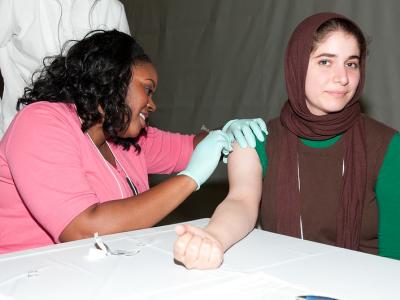Severe COVID-19 may cause 10-point IQ drop, 20-year brain aging
Cognitive impairment from severe COVID-19 is equivalent to losing 10 IQ points or 20 years of aging, and any recovery is slow at best, suggests a small study published late last week in eClinicalMedicine.
A team led by Imperial College London and University of Cambridge researchers tested 46 COVID-19 patients admitted to a single hospital 6 to 10 months earlier, from Mar 10 to Jul 31, 2020, and matched controls. Sixteen of the COVID-19 patients (34.8%) had required mechanical ventilation.
Participants underwent computerized cognitive assessment at an average follow-up of 6 months after their initial infection. The researchers transformed scores from patients and controls into standard deviations (SDs) from expected scores for participants' age and demographic characteristics and calculated global accuracy and response time composites.
The team used linear modeling to predict composite score deficits from illness severity, mental health status at assessment, and time since hospitalization compared with scores from normal age-related cognitive decline and early-stage dementia.
Relative to controls, COVID-19 survivors were both less accurate (G_SScore, -0.53 SDs) and slower in responding (G_RT, +0.89 SDs). COVID-19 severity, rather than mental health status, significantly predicted deviation from expected scores.
The tasks most affected by COVID-19 dealt with higher cognition and processing speed, which was qualitatively different from those of normal aging and dementia but comparable to those of advancing from the age of 50 to the age of 70. The patients' deficits began to lessen over time since infection, but the trend didn't achieve statistical significance.
In a University of Cambridge press release, senior author David Menon, PhD, said, "Cognitive impairment is common to a wide range of neurological disorders, including dementia, and even routine ageing, but the patterns we saw—the cognitive 'fingerprint' of COVID-19—was distinct from all of these. It is very possible that some of these individuals will never fully recover."
Apr 28 EClinicalMedicine study
May 3 University of Cambridge press release
Mayo study finds COVID vaccine materials written at too-high reading level
COVID-19 vaccine informational material is written at more than a 10th-grade reading level and thus is far too difficult to understand for the average American, researchers from the Mayo Clinic concluded in a study published today in Vaccine.
At least 25% of the US population currently has very low-level reading skills and is unable to comprehend a bus schedule or medication and cleaning-product labels, the authors said.
Two study authors independently analyzed the readability and formatting metrics of each document (factsheets for the Moderna, Pfizer, and Johnson & Johnson vaccines, and vaccine information on Centers for Disease Control and Prevention [CDC] websites) using Microsoft Word readability tools and calculators. They based their assessments on three standard reading comprehension metrics used for educational materials.
For the general population, a 7th-grade reading level is required for understanding educational material. The researchers found at least a 10th-grade education would be required to understand the materials from vaccine manufacturers, and most of the material on the CDC websites.
"Our study demonstrates that a significant portion of the U.S. general public is unable to comprehend the available vaccine information in the documents we studied," the authors concluded. "Given the importance of these documents to inform and build trust within the community regarding COVID-19 vaccines, greater effort must be applied to improve the readability of these information documents."
May 3 Vaccine study
Colombian hospital stewardship tied to reduced antibiotics, resistance
A study conducted in hospitals in Colombia found that implementation of antimicrobial stewardship programs (ASPs) was associated with a decline in antibiotic consumption and antibiotic resistance, researchers reported yesterday in BMC Infectious Diseases.
In the retrospective observational study, Colombian researchers measured antibiotic consumption over 48 months at four high-complexity hospitals (institutions A-D) from 2009 to 2012, comparing the 24 months before ASP implementation and 24 months after through an interrupted time series analysis.
They also measured the incidence of meropenem-resistant Acinetobacter baumannii, ceftriaxone-resistant Escherichia coli, ertapenem-resistant Klebsiella pneumoniae, meropenem-resistant Pseudomonas aeruginosa, and oxacillin-resistant Staphylococcus aureus. Common features of the ASPs included a multidisciplinary ASP team, antimicrobial guidelines for the most prevalent infections, and prospective audits and feedback.
Prior to implementation of the ASPs, the four hospitals showed trends toward an increase in broad-spectrum antibiotic consumption (ceftriaxone, cefepime, piperacillin/tazobactam, ertapenem, meropenem, and vancomycin). After ASP implementation, all hospitals saw decreased antibiotic consumption, with the greatest reduction observed in institution B (45%), followed by institution A (29%), D (28%), and C (20%).
The use of ertapenem and meropenem declined in hospital wards, while a decrease in the use of ceftriaxone, cefepime, piperacillin/tazobactam, meropenem, and vancomycin was observed in intensive care units.
In addition, the trend toward an increase of oxacillin-resistant S aureus, ceftriaxone-resistant E coli, and meropenem-resistant P aeruginosa was reversed.
"In our study, we showed that ASPs are a key strategy in tackling the emerging threat of AMR and have a positive impact on antibiotic consumption and resistance," the study authors concluded.
May 2 BMC Infect Dis study












